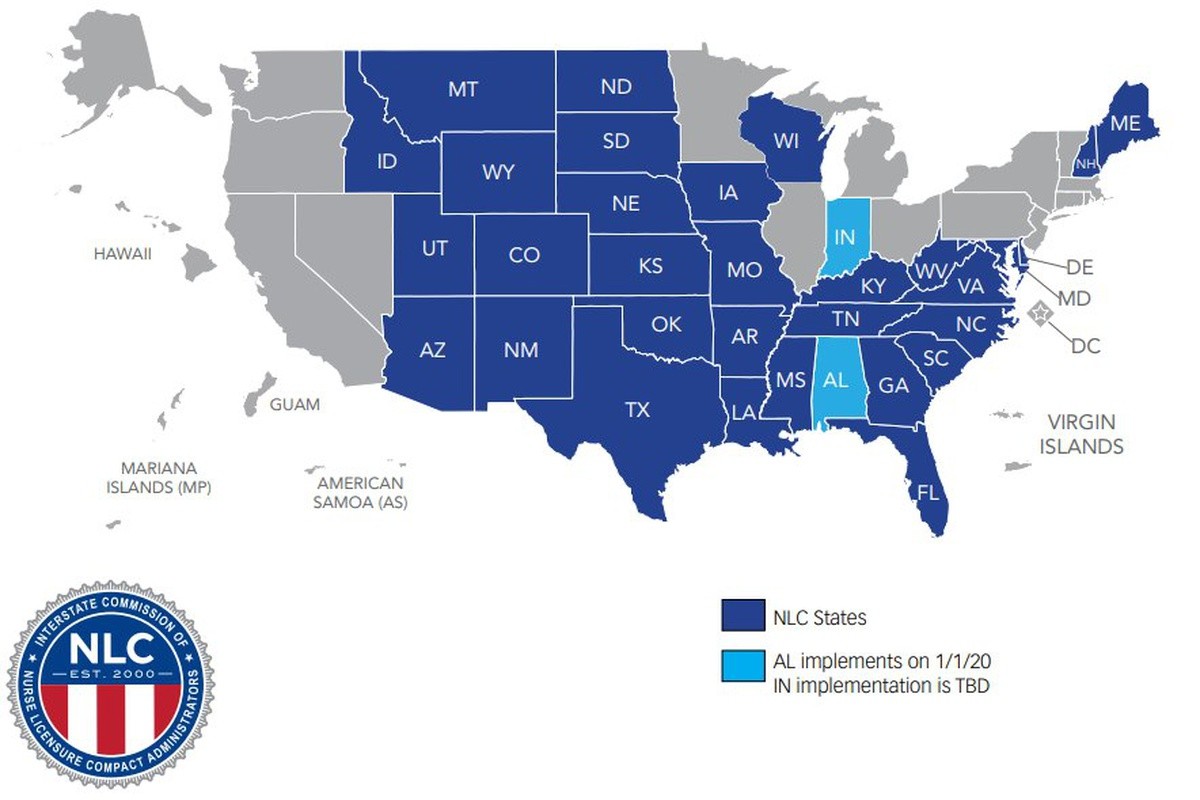29 States and Growing
WHO, WHAT, WHEN, WHERE AND WHY?
Gone are the days when professional careers began and ended with the same employer, let alone in the same city or state. In today’s fluid and often transient environment, many health care professionals struggle with the issue of state licensure. The Nursing Compact Agreement addresses many of these concerns for a significant proportion of the medical profession, namely nursing. The Nursing Compact Agreement gives certain nurses the ability to practice in states other than their home state. These fortunate nurses are able to practice in 29 different states throughout the United States. The flexibility, convenience and opportunities can be a dream come true for nurses and nurse leaders who desire to practice without border restrictions. This is especially helpful for travel nurses and interim nurse leaders.
WHO
“The Nurse Licensure Compact (NLC) allows a nurse, (registered and licensed practical/vocational nurses LPN/VNs) to have one multistate license in the primary state of residence (the home state) and to practice in other compact states (remote states), while subject to each state’s practice laws. The NLC can also be extremely beneficial to military spouses who are nurses since they can be subject to frequent changes of residences across state lines.

Map Source: NCSBN.org
WHAT
Nurses are required to be licensed in the state where they are practicing at the time they are providing nursing services. A NCL gives nurses the ability to practice in their home state as well as any other NCL state without the cost, hassle and time it takes to obtain single states’ licenses. Your primary state of residence (PSOR) refers to your legal residency status. In other words, where your legal documents, such as your driver’s license, federal income taxes, W-2’s or military form #2058 are issued from. It has nothing to do with property ownership so owning property in a NCL state is not grounds for receiving a NCL from that state. If a nurse cannot prove legal residency in a compact state than s/he is not eligible for a NCL. There is no time limit on how long one may practice in a compact state other than your PSOR as long as legal residency is maintained in the state issuing the NCL and that license remains in good standing. If legal residence is in a non-compact state, a nurse can apply for a license by endorsement in a compact state however the ability to practice will be limited to that state only. A compact state license and a multi-state license are considered the same thing; however, a walk-through state is different. A walk-through state issues a temporary license to a registered nurse while s/he is waiting for a permanent license. These can be issued in as little as one hour to one day. These licenses are generally valid for 30-180 days. Many non-walk-through states offer temporary licenses with various qualifications and time frames of less than one year.
WHEN
The age-old nurse license model was not flexible and adaptable to meets today’s nursing needs so the NLC was originally developed in 2000. As of July 9, 2019, New Jersey joined the compact as the newest state to enact NLC legislation. The Enhanced NLC was developed in 2018 to address several standards the original NLC was lacking such as Federal and State fingerprint-based background checks. The NLC was implemented to increase access to care and maintain public protection by providing uniform, quality care across the country.
States with Pending Legislation for the eNLC
- Indiana – [HB 1344] and [SB 436]
- Massachusetts – [HB 1944]
- Michigan – [HB 4042]
- New Jersey – [AB 1597] and [SB 954]
- Pennsylvania – [SB655]
WHERE
The NLC continues to expand yearly but unfortunately several states, namely Alaska, Hawaii, California and Washington are not participating at this time. The NLC also allows nurses to practice electronically as well as physically in participating states, which is a growing segment of nursing profession and very appealing to potential healthcare employers. The NLC is supported by nursing, governing and safety organizations including The American Association of Colleges of Nursing, the US Dept. of State and the National Patient Safety Foundation. A study conducted in 2014 indicated 70% of nurses were in favor of their state joining the N
WHY
The benefits of the Nurse Licensure Compact can be summarized into 6 categories:
- Access to Care: quick and efficient access to nursing services which is especially critical to rural and underserved communities.
- Telehealth: an up and coming solution to underserved and/or busy clients.
- Disaster Relief: nurses can be immediately dispatched across state lines to provide critical services.
- Military Families: military spouses can continue working without obtaining new licenses with each new relocation.
- Online Education: reduces educator’s need for multiple licenses.
- Cost Effective: both for nurses themselves in terms of time, resources and availability and for healthcare employers for the very same reasons. Nurses with multi-state availability are more desirable employees as they can fill immediate vacancies without licensing issues.
The Nurse License Compact has been described as the modern license solution for the 21st Century. Since its inception in 2000, it has proven safe and convenient, incorporating all participating state licensing safeguards, instilling confidence, portability and efficiency. The dynamic and fluid nature of the NLC allows nurses to meet the needs of the country today and into the future.
NHS Solutions has a deep and growing pool of Interim Nurse Leaders with Compact State Licensure. These nurse leaders are able to accept and start new interim assignments within a week in many cases. Contact us if you are interested in joining our team or if your organization has an urgent leadership need. Our website is updated weekly with new interim leadership job opportunities. We are also currently conducting several confidential searches. Inquire about our $1000 referral program if the timing isn’t right for you.
Twitter @NurseCompact
Facebook nurselicensecompact
